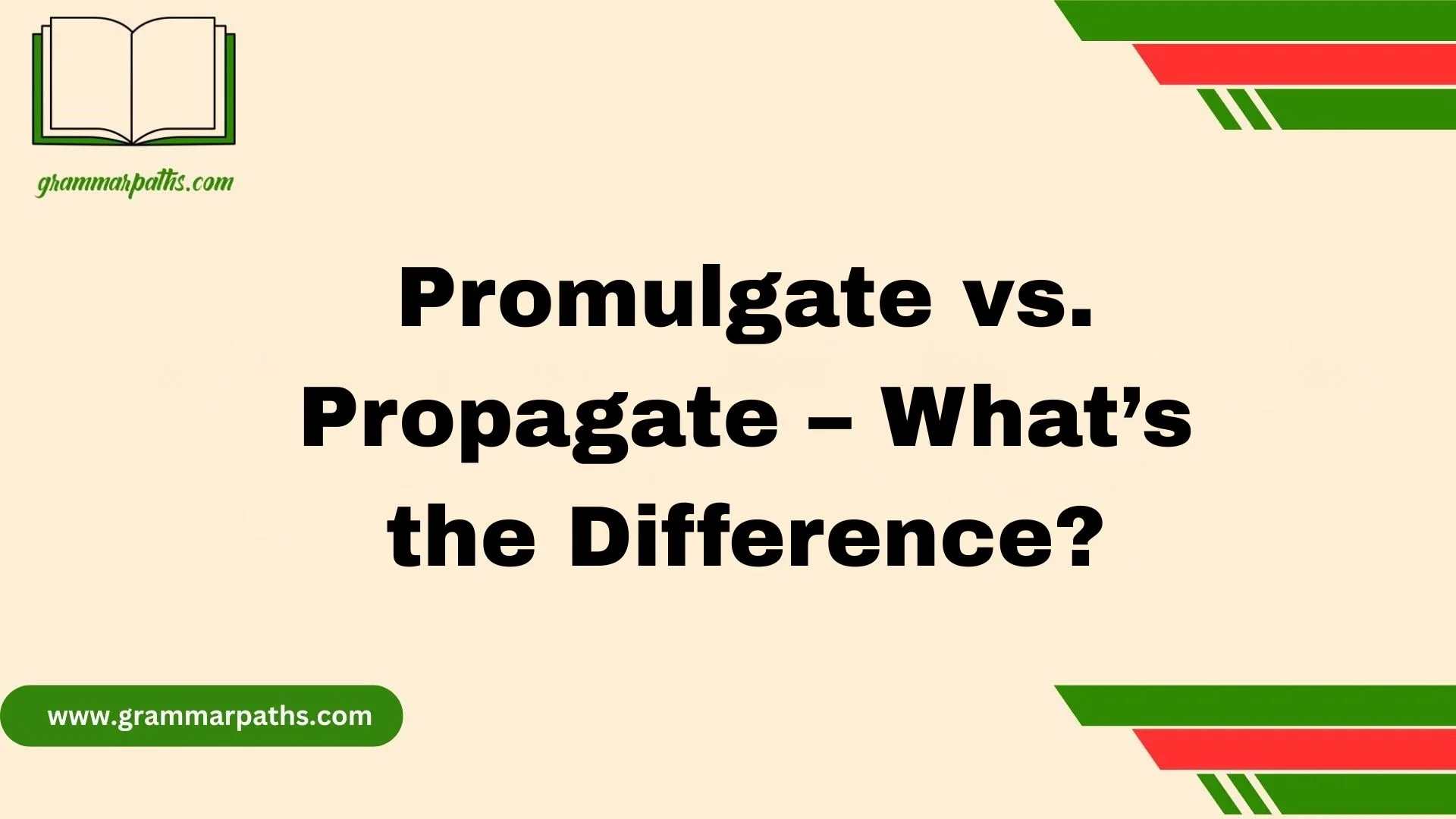When it comes to language, many words appear similar but carry different meanings, and one such pair is promulgate vs. propagate. While these terms are often confused due to their shared connection with communication and spreading information, they serve distinct roles in both formal and informal contexts. Understanding the difference between promulgate and propagate helps in using them correctly in writing, speech, law, and education.
To promulgate generally means to announce, declare, or make official. It is often used in the context of laws, decrees, rules, or doctrines that need to be formally communicated to the public. For instance, a government may promulgate a new regulation to ensure citizens are aware of it. On the other hand, to propagate means to spread, transmit, or promote ideas, beliefs, or practices more broadly. This term is common in discussions about science, religion, culture, and technology, where the focus is on influence and dissemination rather than formal declaration.
By comparing promulgate vs. propagate, we can see that one emphasizes official declaration, while the other highlights widespread distribution. Knowing this distinction not only improves vocabulary precision but also enhances effective communication in everyday and professional use.
Promulgate: Meaning and Usage
The word promulgate carries a strong sense of authority. It comes from the Latin promulgare, meaning to make publicly known. Over time, it became linked with official announcements, especially in law, religion, and governance.
Definition of Promulgate
- To officially declare or make public a law, decree, doctrine, or policy.
- To formally announce something with authority.
Historical Roots
- Latin origin: pro (forth) + mulgare (to publish, announce).
- First appeared in English during the 16th century, often tied to royal decrees or church doctrines.
Common Modern Contexts
- Law: A government promulgates a new regulation.
- Religion: A church promulgates doctrine or dogma.
- Academia: Institutions promulgate policies for students and staff.
- Corporate Governance: Organizations promulgate codes of conduct.
Example Sentences
- The government promulgated new safety regulations to protect workers.
- The university promulgated updated rules for online examinations.
- The church council promulgated a new doctrine on community service.
Synonyms for Promulgate
- Proclaim
- Announce
- Decree
- Enact
- Declare
Key takeaway: Promulgate always implies authority and formality.
Propagate: Meaning and Usage
The word propagate has a broader and more flexible meaning. It comes from the Latin propagare, which means to spread or extend. Unlike promulgate, this word is not tied to authority—it’s about growth, reproduction, or spreading ideas.
Definition of Propagate
- To spread ideas, beliefs, or practices.
- To transmit information, signals, or culture.
- To reproduce or multiply in biology and science.
Historical Roots
- Latin origin: propagare (to cause to multiply).
- First appeared in English in the 15th century, mainly in biology. Over time, its usage expanded into communication and culture.
Common Modern Contexts
- Biology: Plants are propagated by cuttings or seeds.
- Physics/Technology: Radio waves propagate through space.
- Society/Media: Beliefs or rumors propagate on social platforms.
- Culture/Religion: Traditions propagate across generations.
Example Sentences
- Gardeners propagate roses by using stem cuttings.
- False information can quickly propagate online.
- Scientists studied how light waves propagate in different materials.
Synonyms for Propagate
- Spread
- Multiply
- Transmit
- Reproduce
- Disseminate
Key takeaway: Propagate is about spreading and multiplying, whether it’s plants, signals, or ideas.
Key Differences Between Promulgate and Propagate
Although both words touch on the idea of spreading something, their tone, domain, and context differ significantly.
| Feature | Promulgate | Propagate |
| Definition | To officially declare or announce | To spread, transmit, or reproduce |
| Tone | Formal, authoritative | General, scientific, or casual |
| Domains | Law, governance, religion, policy | Science, biology, media, culture |
| Action | Issuing an official decree or rule | Spreading ideas, signals, or organisms |
| Synonyms | Proclaim, enact, declare | Spread, multiply, transmit |
| Example | “The court promulgated a new legal standard.” | “The scientist propagated the species in a lab.” |
In short: Promulgate = official announcement. Propagate = spread or multiply.
Promulgate vs. Propagate in Real-World Contexts
Understanding how each word appears in everyday life makes the distinction clearer.
Legal Writing and Governance – Promulgate
- A state legislature promulgates a law.
- The U.S. Constitution has provisions that are promulgated by Congress.
- Example: The Environmental Protection Agency promulgated stricter air quality standards in 2024.
Science and Academia – Propagate
- Physicists study how sound waves propagate underwater.
- Biologists propagate endangered plants in greenhouses.
- Example: Researchers found that misinformation propagates faster than verified news on social media.
Media and Society – Both in Action
- Government promulgates official policies through press releases.
- Media platforms propagate those announcements to the public.
- Example: The World Health Organization promulgated a new health guideline, which was then widely propagated across global news outlets.
Examples Illustrating Contextual Differences
Sometimes, using the wrong word can alter meaning entirely.
- Correct: The governor promulgated a new education law.
- Incorrect if swapped: The governor propagated a new education law. (This sounds as if the governor planted or spread the law like a rumor.)
- Correct: Gardeners propagate orchids by tissue culture.
- Incorrect if swapped: Gardeners promulgate orchids by tissue culture. (This makes no sense in a scientific context.)
Mini Case Study – Law vs. Social Media
- Scenario 1: A new cybercrime law is officially declared. → Correct word: Promulgate
- Scenario 2: A rumor about cybercrime penalties spreads on Twitter. → Correct word: Propagate
Lesson: Choosing the wrong word can undermine credibility.
Common Misconceptions and Errors
Many English learners and even native speakers stumble over these words. Here are frequent mistakes:
- Misconception 1:Promulgate is outdated or only religious.
- Truth: It’s still widely used in law and government.
- Misconception 2:Propagate only refers to biology.
- Truth: It applies equally to spreading ideas, rumors, or signals.
- Misconception 3: The words are interchangeable.
- Truth: They overlap only in the sense of “spreading information,” but promulgate implies authority while propagate implies diffusion.
Practical Tips to Remember the Difference
- Mnemonic:
- Promulgate starts with pro like proclaim. Think announce officially.
- Propagate starts with prop like propeller, which spreads movement. Think spread or multiply.
- Visual Analogy:
- Imagine a president promulgating a law from a podium.
- Imagine a gardener propagating plants in a greenhouse.
- Quick Test:
- If it involves authority, use promulgate.
- If it involves spreading or growth, use propagate.
Conclusion
The comparison of promulgate vs. propagate highlights how two similar-looking words can carry very different meanings. Promulgate is tied to the formal announcement, declaration, or publication of laws, decrees, and official information. Meanwhile, propagate refers to the spreading, sharing, or promoting of ideas, beliefs, or practices across a wider audience. By understanding this difference, you can use each term with clarity, precision, and confidence in both professional and casual settings. Mastering these nuances enriches your vocabulary and strengthens your communication skills.
FAQs
Q1. What does promulgate mean in law?
Promulgate in law means to officially announce or publish a law, regulation, or decree so that it becomes valid and enforceable.
Q2. Can you use promulgate and propagate interchangeably?
No. Promulgate refers to a formal declaration, while propagate refers to spreading ideas or concepts.
Q3. What are examples of propagate in daily life?
Examples include propagating cultural values, spreading scientific knowledge, or sharing religious beliefs with others.
Q4. Which term is more formal—promulgate or propagate?
Promulgate is more formal, especially in legal, academic, or governmental contexts, while propagate is broader and fits everyday use.
Q5. Why is it important to know the difference between promulgate and propagate?
It ensures accurate word choice, prevents miscommunication, and helps in both writing and professional communication.

Emma Brooke is a passionate language expert and contributor at GrammarPaths.com, where she helps learners navigate the complexities of English grammar, idioms, and effective writing. With a strong academic background and years of teaching experience, Emma excels at turning tricky grammar rules into simple, practical lessons that readers can easily grasp.










